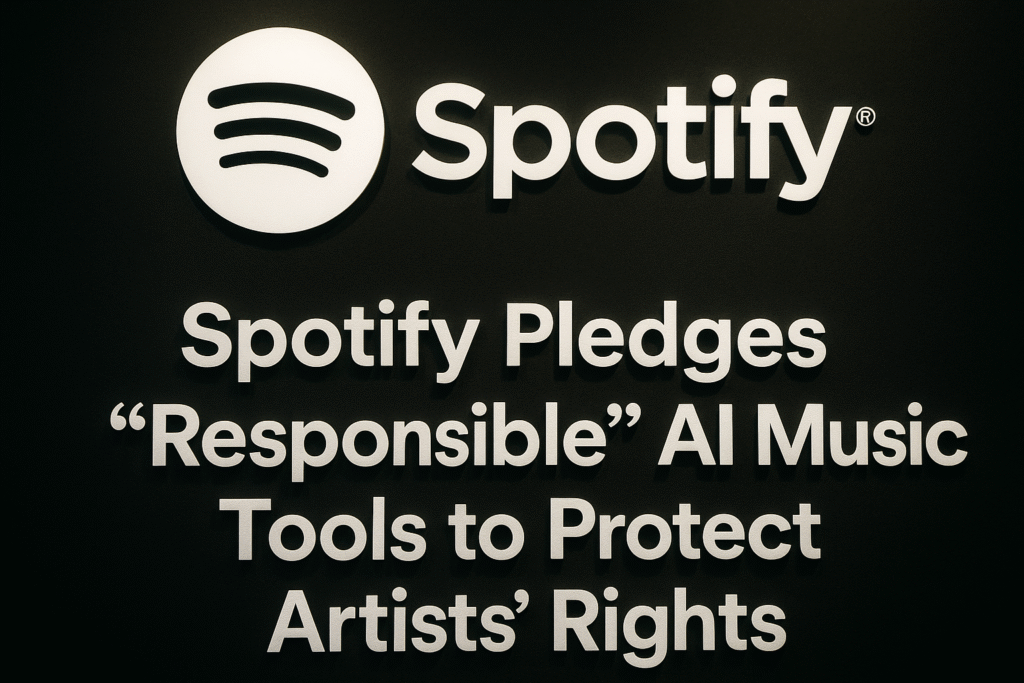By Harshit | October 18, 2025 | New York | 12:00 AM EDT
Spotify Moves to Put Artists First in AI Music
Spotify, the world’s largest music streaming platform, has announced a major initiative to integrate artificial intelligence (AI) into its services in a way that prioritizes artists and songwriters. The company emphasized that these AI tools will be designed to respect copyright, fairly compensate creators, and be offered only with their consent.
Spotify’s plan involves licensing music from the three dominant global labels — Sony Music, Universal Music Group, and Warner Music Group — as well as from rights firm Merlin and digital music company Believe. The initiative aims to ensure that any AI-driven features enhance the listener experience without undermining artists’ revenues or control over their work.
Co-president Alex Norstrom underlined the company’s approach, stating, “Technology should always serve artists, not the other way around.” By allowing artists to opt in to AI features, Spotify hopes to set a precedent for ethical use of AI in music, where creators are active participants rather than passive sources of data.
Industry Concerns and Criticism
The move comes amid heightened scrutiny of AI in music. Several high-profile musicians, including Dua Lipa, Sir Elton John, and Sir Paul McCartney, have publicly criticized AI tools trained on their music without permission or compensation. Critics argue that generative AI could further dilute the already limited revenue streams for artists.
Max Bonanno, managing partner at New Orleans-based MidCitizen Entertainment, warned that AI-generated content could “pollute the creative ecosystem” by diverting royalties from human artists to automated music. He added, “AI-generated songs have diluted the already limited share of revenue that artists receive from streaming royalties.”
Despite these concerns, some experts welcomed Spotify’s approach. Ed Newton-Rex, founder of Fairly Trained, said, “Lots of the AI industry is exploitative — AI built on people’s work without permission, served up to users who get no say in the matter. This is different — AI features built fairly, with artists’ permission, presented to fans as a voluntary add-on rather than an inescapable funnel of AI slop. It looks like a move towards a more ethical AI industry, which is sorely needed.”
How Spotify Already Uses AI
Spotify does not create original music using AI, but it employs the technology in ways that enhance discovery and user experience. For example, AI powers features such as the “daylist” playlist generator and the AI DJ, which curates and transitions songs for listeners.
AI is also widely used in music production workflows, including tasks like autotuning, mixing, and mastering. Spotify has taken steps to prevent misuse of AI on its platform. In 2023, a viral AI-generated song using cloned voices of Drake and The Weeknd was removed after violating artist rights. Spotify now requires clear disclosure of AI use in music creation, particularly to prevent impersonation or misleading content.
Even iconic works have benefited from responsible AI. The Beatles’ 2023 single “Now and Then” utilized AI to enhance John Lennon’s old recordings, demonstrating how technology can augment music without replacing the human artist.
Plans for AI Tools and Artist Compensation
While the exact nature of Spotify’s new AI features remains under wraps, the company has said it will ensure artists, songwriters, and rights holders are properly credited and compensated. These arrangements will be formalized through upfront agreements, rather than asking for forgiveness after the fact.
Spotify intends for AI to act as a creative aid rather than a replacement. For instance, AI could help listeners discover new music, suggest song arrangements, or provide inspiration for artists in the studio. By working closely with major labels and rights organizations, Spotify hopes to create a system where AI complements human creativity rather than eroding it.
Balancing Innovation with Ethics
Spotify’s announcement reflects broader industry trends. As AI tools become more sophisticated, companies face growing pressure to balance innovation with ethical obligations to creators. Warner Music Group CEO Robert Kyncl stressed, “Collaborating with partners who understand the necessity for new AI licensing deals protects rightsholders and the creative community.”
The initiative also comes at a time when AI-generated content is rapidly expanding across platforms, raising questions about copyright, royalties, and creative ownership. By giving artists the choice to participate and ensuring transparent compensation, Spotify hopes to provide a model for responsible AI adoption.
Looking Ahead
Spotify’s push for “responsible AI” signals an important shift in the music industry. The company is attempting to integrate AI tools that enhance discovery, aid creative workflows, and deliver new fan experiences — all while respecting artists’ rights. While challenges remain, particularly around ensuring fair compensation and preventing misuse, the move has been described by experts as a positive step toward ethical AI in music.
Spotify’s approach may set a precedent for other streaming platforms, potentially reshaping how AI interacts with music creation and consumption in the coming years.

